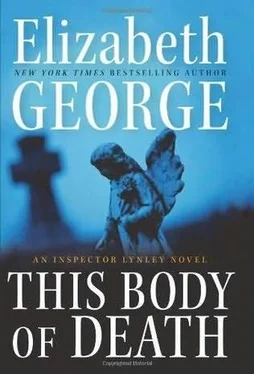“A photo-copier.”
“Ah,” he said. “And if there’s nothing to copy? Most of this is stored on computer.”
“A printer then. Someone else’s printer. Someone else’s computer. There are ways, Norman, and you’ve got to find one. We’re talking life and death. A female corpse up in Stoke Newington and something rotten-”
“-in Denmark,” Norman said. “Yes. I see.”
Barbara wondered what the hell he was talking about, but she twigged it before she made a fool of herself and asked what Denmark had to do with the price of salami. She said, “Ah. Very good. Too bloody right. Thing to remember is that what looks ordinary might not be ordinary. This bloke’s managed to get as far as chief superintendent in the Hampshire Constabulary, so we’re not likely to stumble on smoking guns.”
“Something subtle. Yes. Of course.”
“So?” Barbara asked him.
He would see what he could do, Norman told her. Meantime, did they need a code word? Perhaps a signal? Some way for him to tell her that he had the goods for her without phoning New Scotland Yard? And if he was to make copies of anything, where would the drop be located?
Obviously, Barbara thought, he’d been reading far too much early John Le Carré. She decided she would have to play along. The drop, Barbara told him, sotto voce, would be at the cash-point machine in front of Barclays in Victoria Street. He would ring her personal mobile phone and say, “Drinks tonight, luv?” and she would know to meet him in that spot. She would stand behind him in line. He would leave the goods at the cash-point machine when he withdrew money or at least pretended to withdraw money. She would then pick it up with her own cash when she used the machine. Not the most sophisticated system, she knew, considering all the CCTV cameras that would be documenting every movement in the vicinity, but it couldn’t be helped.
Norman said, “Right, then,” and waited for her to hand over her mobile number. They parted.
Barbara said to his retreating back, “Soon, Norman.”
“Life and death,” was his reply.
God, she thought, the lengths she went to in the cause of finding a killer. She returned to Victoria Block.
Back in the incident room, there was some serious milling about going on. She learned this had to do with a report from SO7 that had just come in: The blood sprayed on the yellow shirt from the Oxfam bin did indeed belong to Jemima Hastings. Well, Barbara thought, they had reckoned as much.
She approached the china board with its array of photos, its scrawled information, its names listed, and its timelines drawn. She hadn’t had a good look at it since being recalled from Hampshire, and among other things up there was a decent photo of the yellow shirt. It might tell her something, she thought. She wondered how Whiting looked in yellow.
But it was not the shirt that caught her attention, as things turned out. It was another photograph altogether. She looked upon the picture of the murder weapon, of the ruler placed next to it to indicate its size.
When she saw it, she spun round from the photo to seek out Nkata. From across the room he glanced up at that moment, a phone pressed to his ear, and he obviously clocked her expression because he said a few more words to whoever was on the other end of the line before ringing off and coming to join her. She said, “Winnie…,” and pointed to the picture. She didn’t need to say more. She heard him breathe out in a whistle, so she knew he was thinking what she was thinking. The only question was whether his conclusion was the same.
She said, “We’ve got to get back to Hampshire.”
He said, “Barb-”
“Don’t argue.”
“Barb, we been ordered back. We can’t head off like we’re in charge here.”
“Phone her, then. She’s got her mobile.”
“We c’n ring down there. We c’n tell th’ cops to-”
“Ring where? Hampshire? With Whiting in charge? Winnie, good God, d’you think that makes sense?”
He looked at the photo of the weapon, then at the photo of the yellow shirt. Barbara knew he was thinking of the politics behind what she was proposing, and in his hesitation, she had her answer to the question concerning on what side of the line Winnie would always walk. She couldn’t blame him. Her own career was so chequered that a few more black marks hardly mattered. His career was not.
She said, “All right. I’ll phone the guv. But then I’m going. It’s the only way.”
TO HER RELIEF Isabelle Ardery discovered that Hiro Matsumoto did have some influence over his sister. After some conversation in their brother’s hospital room, Miyoshi Matsumoto emerged and told Isabelle she could speak to Yukio. But if her younger brother became upset either by Isabelle’s questions or her presence, the interview would end at once. And she-not Isabelle-would be the one to determine how “upset” might manifest itself.
Isabelle had no choice but to agree to Miyoshi’s rules. She fished her mobile out of her bag and switched it off. She wanted to take no chances that anything external to her own questions might disturb the violinist.
Yukio’s head was bandaged, and he was hooked up to various machines and IV drips. But he was conscious and he seemed to be taking some comfort from the presence of his two siblings. Hiro had positioned himself near his brother’s shoulder where he’d laid his hand. Miyoshi took a place on the other side of the bed. She fussed maternally with the neck of his hospital gown as well as with the thin blanket that covered him. She eyed Isabelle suspiciously. She said, “You’ve the time it will take Mrs. Bourne to arrive.”
That, Isabelle saw, had been the compromise the siblings had reached. Hiro had phoned the solicitor in exchange for his sister’s agreeing to allow Isabelle a few minutes’ access to their brother. She said, “Very well,” and she studied the violinist. He was smaller than he’d seemed in flight. He looked far more vulnerable than she would have expected.
She said to him, “Mr. Matsumoto…Yukio, I’m Detective Superintendent Ardery. I need to speak with you, but you’re not to worry. What we’re saying here-in this room-is not being recorded or documented. Your brother and sister are here to make sure I don’t upset you, and you can be assured that upsetting you is the least of my intentions. Do you understand me?”
Yukio nodded although his gaze fluttered over to his brother first. There was, Isabelle saw, only a faint resemblance. Although Hiro Matsumoto was the elder, he looked years younger.
“When I went to your lodgings in Charing Cross Road,” Isabelle told Yukio, “I found a piece of iron, pointed like a spike, on the edge of the basin. It had blood on it and that blood turned out to belong to a woman called Jemima Hastings. Do you know how that spike got there, Yukio?”
Yukio didn’t respond at first. Isabelle wondered if he would at all. She’d never before confronted a paranoid schizophrenic, so she had no idea what to expect.
When he finally spoke, he indicated his neck, in the approximate location of the wound to Jemima Hastings. “I pulled it out,” he said.
“The spike?” Isabelle clarified. “You pulled the spike from Jemima’s neck?”
He said, “Tore.”
“The spike tore her skin? Made the wound worse? Is that what you’re saying?” It certainly matched the condition of her body, Isabelle thought.
“Don’t direct him to say what you want him to say,” Miyoshi Matsumoto said sharply. “If you’re going to ask my brother questions, he’s going to answer them in his own way.”
Yukio said, “Life’s fountain came forth, like God telling Moses to tap upon stone. From the stone comes water to soothe their thirst. The water is a river and the river turns to blood.”
Читать дальше












